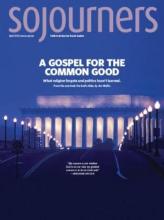AT TIMES IT SEEMS VERY HARD to realize that half a century has passed since my late wife, Rosemarie, and I were in Birmingham, Ala., living out a part of our years of service as representatives of the Mennonite churches of America to the Southern freedom movement—that historic black-led struggle for the expansion of democracy in America (inadequately labeled "the civil rights movement").
It was in the midst of those powerful days, in the late winter and early springtime of 1963, when our extraordinary people's movement was spreading to dozens of communities across the South, with some important reverberations in the North, and across the world as well. Usually initiated by courageous home-grown black leaders such as Rev. Fred Shuttlesworth of Birmingham and Victoria Gray of Palmers Crossing, Miss., the determined local groups often called upon national or South-wide organizations to help them in their campaigns.
Late in 1961, Shuttlesworth, who was part of the King-led Southern Christian Leadership Conference (SCLC), asked Martin Luther King Jr. and SCLC to come help the Birmingham movement. It faced a level of continuing white terrorism that led the black community to call their city "Bombingham," referring, of course, to the deadly violence they encountered whenever they attempted to challenge the white segregationist powers who were determined to keep black people in a submissive, separate, and dominated role.
When King and SCLC decided to respond to Shuttlesworth and move onto the Birmingham scene, Rosemarie and I were already friends and co-workers with Martin and Coretta, and King asked us to come participate in the struggle for the transformation of Birmingham. So we were present and in the line of marchers when King, his co-worker Ralph Abernathy, and others were arrested in early April 1963.
Read the Full Article
